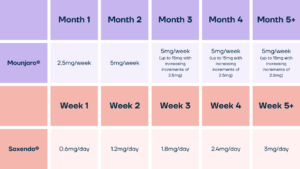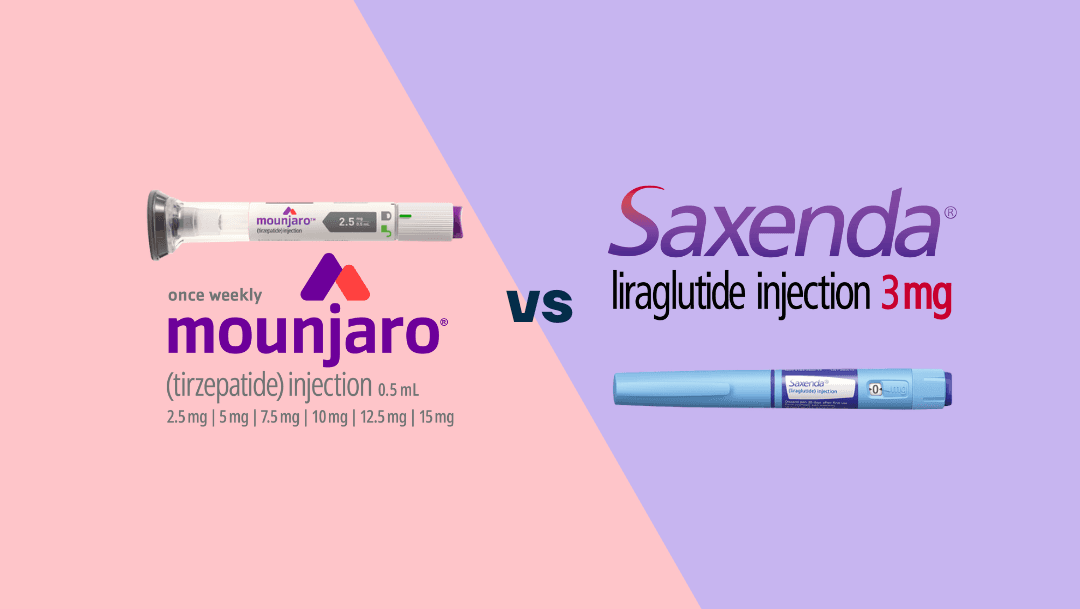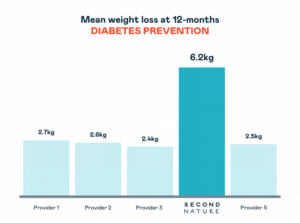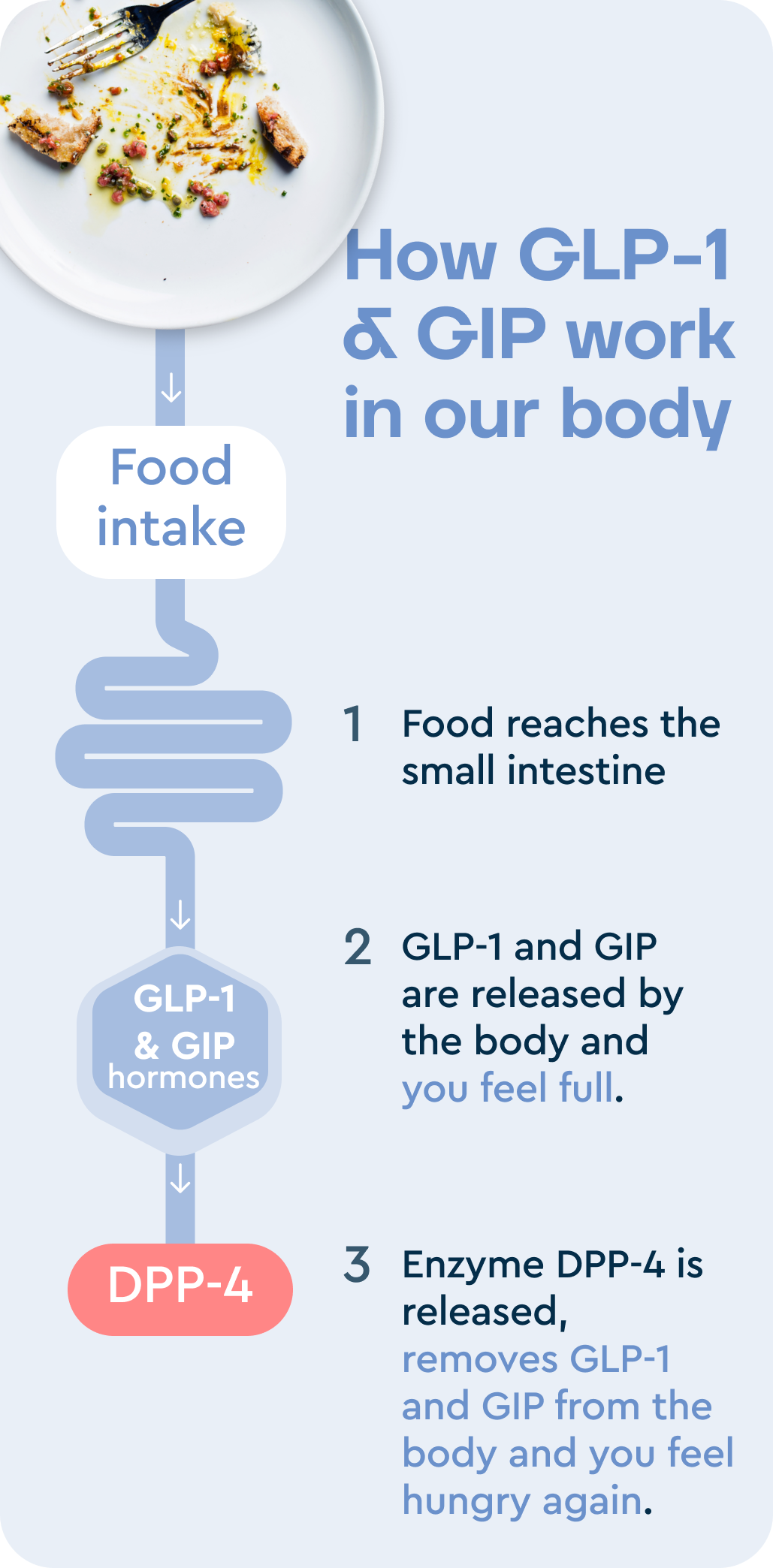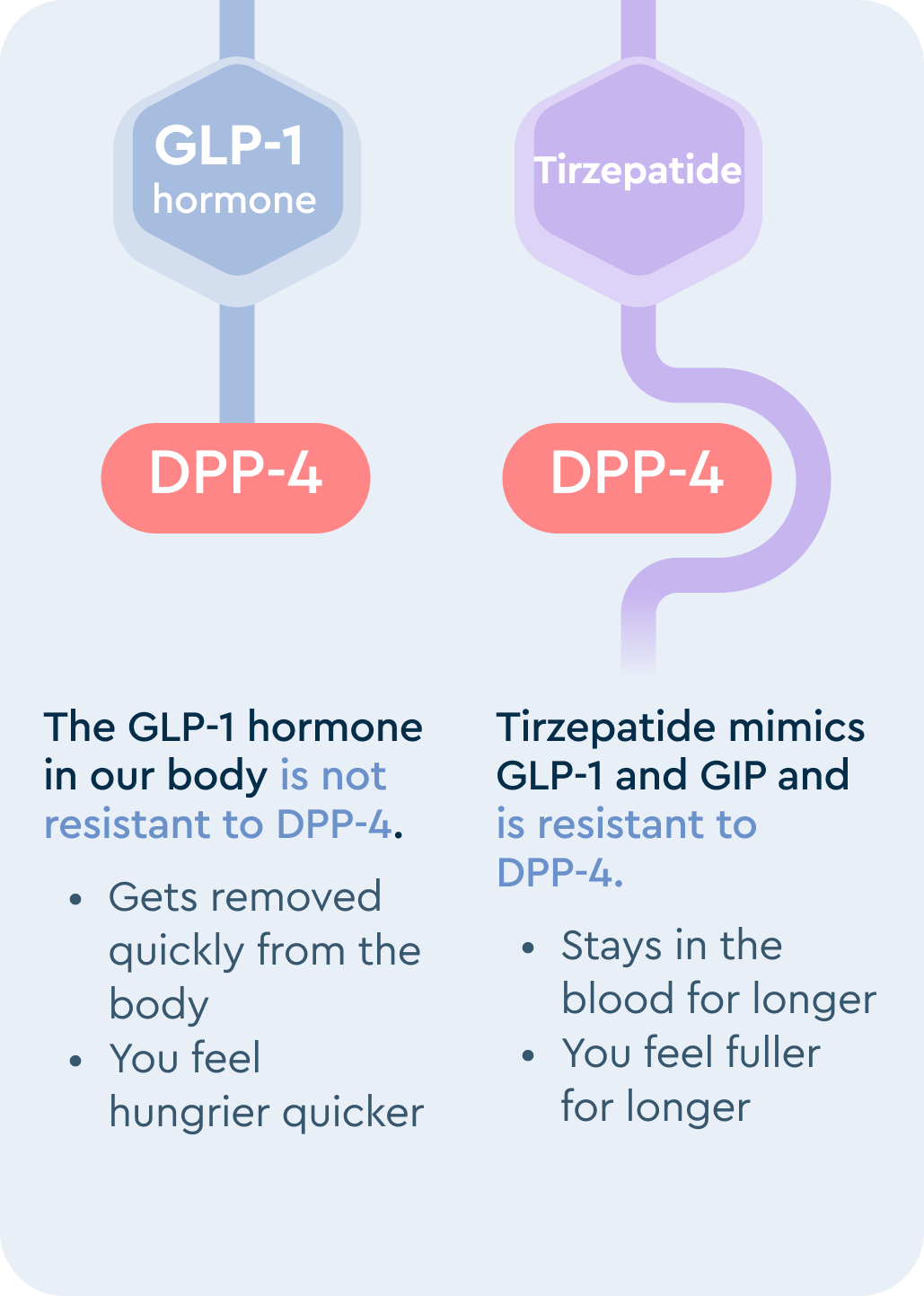When we eat food, our gut releases hormones that help the body regulate hunger and blood sugar levels. One of these hormones is called GLP-1 (glucagon-like peptide-1).
GLP-1 improves insulin function to lower blood sugar levels and delay gastric emptying, decreasing appetite.
GLP-1 also communicate with the brain’s appetite control centre, the hypothalamus, to lower food-seeking behaviour.
However, GLP-1 is removed rapidly from the body by an enzyme called DPP-4. It’s been shown that up to 50% of the GLP-1 released from the gut after a meal is removed by DPP-4 within 2 minutes.
Tirzepatide and liraglutide work because they’ve been manufactured to resist DPP-4 and can stay in the body for much longer.
In addition to these actions, tirzepatide also mimics a hormone called GIP, which shares many similarities with GLP-1.
GIP is a hormone released in response to food that helps regulate blood sugar levels and helps our fat cells ‘absorb’ more excess energy, preventing fat from being stored in the liver or pancreas.
GIP also has receptors in the brain, similar to GLP-1, and scientists believe it’s also involved in regulating appetite.
The dual actions of tirzepatide are one of the reasons that it generally leads to more weight loss than liraglutide.
2) Do you lose more weight on tirzepatide or liraglutide?
Research suggests that tirzepatide leads to around 15% more weight loss than liraglutide.
Studies have shown that liraglutide leads to an average weight loss of 6.4%. Comparatively, tirzepatide leads to a weight loss of up to 21%, depending on the dose.
5 mg of tirzepatide leads to around 15% weight loss, 10 mg 19%, and 15 mg 21%.
The more weight loss we generally see with tirzepatide is likely due to its dual-action of mimicking both GLP-1 and GIP hormones.
Additionally, research has shown that long-acting GLP-1 weight-loss injections like tirzepatide are more effective than short-acting ones like liraglutide.
Tirzepatide maintains a higher level in the body over a sustained period of time, which is why it’s only injected once a week.
Liraglutide, in comparison, is injected daily, and its levels are more likely to rise and fall in the body.
Which is better for HbA1c, tirzepatide or liraglutide?
The hormone GLP-1 binds to GLP-1 receptors in the pancreas to increase insulin release after a meal. It also prevents the body from releasing too much glucagon, a hormone that increases blood sugar levels.
These two mechanisms support individuals living with type 2 diabetes in managing their blood glucose levels on a meal-to-meal basis.
Research has shown that GLP-1s are effective at reducing blood glucose for people living with type 2 diabetes.
Liraglutide (Saxenda) was one of the earlier forms of longer-lasting GLP-1s, while tirzepatide is a dual-action type 2 diabetes medication.
Alongside its effects on GLP-1, tirzepatide mimics the actions of another hormone called GIP (gastric inhibitory polypeptide) that reduces blood sugar levels.
Liraglutide reduces HbA1c (average blood glucose) levels by around 1.3% on average and fasting plasma glucose by 2 mmol/L.
In comparison, studies have shown that tirzepatide is more effective and reduces HbA1c levels by up to 2.3% and fasting plasma glucose by 3 mmol/L.
So, GLP-1 receptor agonists significantly reduce blood sugar levels and are an effective treatment for type 2 diabetes—particularly the longer-lasting and recent versions of GLP-1s, semaglutide and tirzepatide.
Interestingly, the lasting effect of GLP-1s to support type 2 diabetes might be its impact on reducing appetite and supporting weight loss than the impact it has on the pancreas.
Key points:
- GLP-1 hormone increases insulin release after a meal and prevents the release of too much glucagon, helping manage blood glucose levels in individuals with type 2 diabetes
- GLP-1 receptor agonists, particularly longer-lasting versions semaglutide and tirzepatide, are effective in reducing blood sugar levels
- Tirzepatide is a dual-action medication that mimics the actions of GIP, reducing blood sugar levels further
- GLP-1s also reduce appetite and support significant weight loss of more than 10%, which is associated with reduced complications of obesity
- Tirzepatide is more effective than liraglutide in reducing both blood sugar levels and weight
3) Tirzepatide vs liraglutide: Which one should you choose?
Effectiveness
Tirzepatide is generally a more effective drug than liraglutide. As demonstrated above, tirzepatide leads to more clinically significant weight loss and blood sugar reductions than liraglutide.
So, if you were looking at trying GLP-1 medications for weight loss or blood sugar improvements, tirzepatide would be the better choice.
However, the drugs differ in their side effects and safety profiles which might influence your decision.
Side effects and safety
All medications have possible side effects, particularly if you live with other health conditions.
Some will be mild but uncomfortable, such as cramping and constipation, and others will be more severe, such as shortness of breath. You must report any side effects you experience to your doctor and healthcare team when on medications.
The main side effects of tirzepatide and liraglutide are GI-related, such as nausea, vomiting, constipation, and diarrhoea.
However, tirzepatide appears to be better tolerated than liraglutide. Studies have shown that between 5-10% of participants discontinue their tirzepatide medication due to side effects, compared with 27% on liraglutide.
Cost
Tirzepatide cost
Tirzepatide costs £9.95 with an NHS prescription. With Second Nature, tirzepatide costs £229 a month, rising to £299 which includes one-on-one support from a registered nutritionist.
Liraglutide cost
The cost depends on where you’re purchasing it from and how long you intend to use the medication. However, to purchase liraglutide and injectable pens required for 56 days would cost £323.99, or around £160 per month.
The price would then increase incrementally the longer you use the medication. liraglutide is generally recommended for up to 12 weeks, costing anywhere between £485-£540.
Liraglutide is available on prescription in UK pharmacies if you’re eligible.
In the U.S., the cost depends on where you’re purchasing it from and how long you intend to use the medication.
However, the current price for a complete package of liraglutide in the U.S. is around $1,430. Check with your insurance provider to see if they will cover all or some of this.
Key points:
- Tirzepatide is more effective than liraglutide at supporting weight loss and blood sugar reductions
- However, liraglutide seems to lead to fewer side effects and is better tolerated than tirzepatide
- However, individuals will vary in their medication response, so choose the right one for you
- Both medications are expensive if you opt to purchase them privately
Take home message
Weight-loss injections are designed as additional tools for weight management interventions and shouldn’t be considered lifelong medications.
Instead, they should be used to help you kickstart your weight loss and healthy journey while you commit to living a healthier lifestyle.
Consider the use of antidepressants for people living with depression. They’re not designed to cure the condition. Instead, they’re designed to allow room for therapy to treat the condition’s underlying cause.
Tirzepatide, and other weight loss injections, like Ozempic and Wegovy, are similar. They can allow you to make lifestyle changes to support long-term weight loss maintenance.
Tirzepatide can help silence food-related thoughts and also give you a boost of confidence with more immediate weight-loss results.
This helps to buy you the time and headspace to understand why your body may have struggled to lose weight previously, and to build new long-term healthy habits.
The core focus of our medication programmes is to calm down the feeling of food noise, lower your cravings, and allow you to build healthier habits to keep the weight off for good.
The ultimate goal is to make losing weight feel second nature.
Second Nature’s medication programme
Second Nature currently provides Mounjaro as part of our Mounjaro weight-loss programme.
Why should you choose Second Nature over other medication providers if you’ve decided to try Mounjaro (assuming you’re eligible)?
For peace of mind.
Second Nature has worked with the NHS for over 6 years providing weight-loss programmes across the UK.
While our Mounjaro weight-loss programme is private and not currently used by the NHS, we’ve built the programmes focusing on scientific evidence, patient safety, and data security.
We hope that our 6+ years of working with the NHS and building a track record of effective weight-loss results will give you peace of mind to give us a try.
